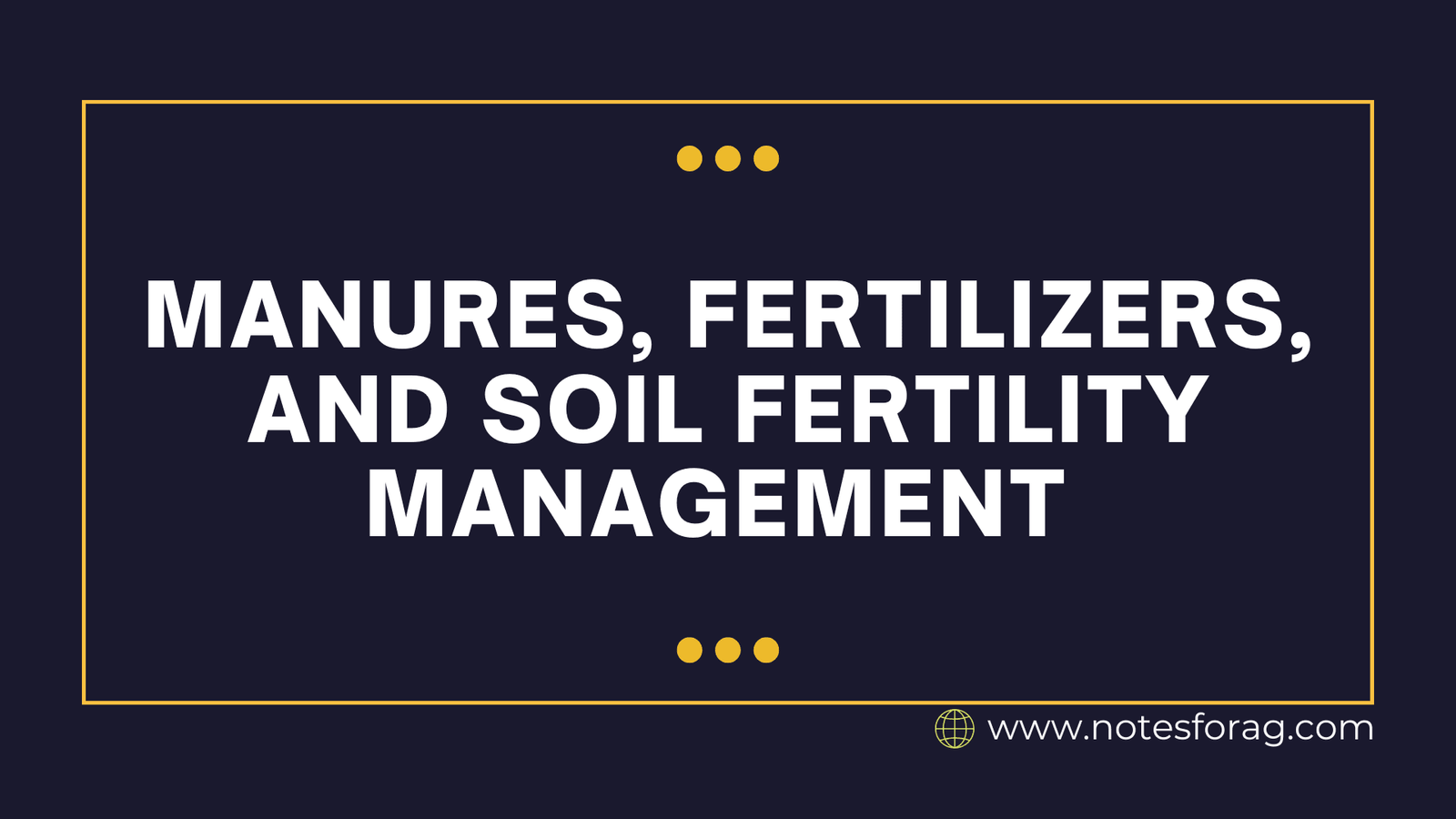Soil fertility serves as the foundation for successful agriculture, providing crops with the essential nutrients needed for growth and optimal yields. To maintain and enhance soil productivity, farmers and agronomists utilize a combination of natural and synthetic inputs, such as manures and fertilizers, alongside strategic soil fertility management practices. These methods not only address nutrient deficiencies but also promote sustainable farming by improving soil health and reducing environmental impacts.
This comprehensive guide delves into the essential role of manures, fertilizers, and soil fertility management in contemporary agricultural practices. It highlights the numerous benefits these elements provide, such as enhanced crop yields, improved soil structure, and increased nutrient availability. Manures, which can be derived from livestock, poultry, or organic waste, contribute organic matter and vital nutrients, enriching the soil ecosystem. Fertilizers, whether synthetic or organic, offer a targeted approach to supplementing essential nutrients like nitrogen, phosphorus, and potassium, which are crucial for plant growth.
Ultimately, understanding the interplay between these components is crucial for farmers and agricultural professionals striving to maintain a sustainable balance between maximizing agricultural productivity and preserving environmental integrity. This holistic approach not only fosters healthier crops but also promotes long-term soil health and ecosystem stability.
Table of Contents
Objective of Manures, Fertilizers, and Soil Fertility Management
The Objective of Manures, Fertilizers, and Soil Fertility Management are:
- To increase the availability of essential nutrients in the soil, thereby improving crop yield and quality.
- To maintain or improve the soil’s physical, chemical, and biological properties over time, ensuring long-term agricultural viability.
- To provide plants with a balanced supply of macro and micronutrients, ensuring optimal growth and development.
- To enhance soil aeration, water retention, and drainage by incorporating organic matter from manures.
- To address specific nutrient shortages in the soil using fertilizers and tailored soil management practices.
- To minimize environmental degradation by adopting eco-friendly practices, such as integrated nutrient management and conservation techniques.
- To optimize the application of nutrients, preventing overuse or underuse of fertilizers and reducing wastage.
- To promote beneficial microbial activity in the soil, which supports nutrient cycling and soil fertility.
Key Topics in Manures, Fertilizers, and Soil Fertility Management
The Key Topics in Manures, Fertilizers, and Soil Fertility Management are:
1. Introduction to Soil Fertility
- Definition and importance of soil fertility in agriculture.
- Factors affecting soil fertility (physical, chemical, and biological properties).
2. Manures
- Definition and significance of manures in enriching soil.
- Types of manures: farmyard manure, compost, green manure, and vermicompost.
- Preparation and application methods.
- Benefits of organic matter for soil health and structure.
3. Fertilizers
- Definition and role of fertilizers in modern farming.
- Classification of fertilizers: nitrogenous, phosphatic, potassic, and micronutrient fertilizers.
- Advantages and limitations of chemical fertilizers.
- Guidelines for efficient fertilizer application.
4. Integrated Nutrient Management (INM)
- Concept and benefits of integrating organic and inorganic nutrient sources.
- Techniques for balanced nutrient supply and sustainable agriculture.
5. Soil Testing and Analysis
- Importance of soil testing for nutrient management.
- Methods for determining soil pH, nutrient content, and organic matter levels.
- Using soil test results to guide fertilizer and manure application.
6. Nutrient Cycles in Soil
- Overview of nitrogen, phosphorus, and potassium cycles.
- Role of microorganisms in nutrient cycling.
7. Improving Soil Structure and Health
- Practices to enhance soil aeration, water retention, and microbial activity.
- Role of organic amendments and reduced tillage in maintaining soil health.
8. Environmental Impacts of Fertilizer Use
- Issues like soil degradation, water pollution, and greenhouse gas emissions.
- Mitigation strategies for minimizing environmental harm.
9. Sustainable Soil Fertility Management
- Crop rotation, cover cropping, and conservation tillage.
- Organic farming and its contribution to soil health.
- Use of biofertilizers and natural amendments.
10. Future Trends in Soil Fertility Management
- Innovations like precision farming and smart nutrient delivery systems.
- Advancements in biofertilizers and organic alternatives.
Importance of Manures, Fertilizers, and Soil Fertility Management
The Importance of Manures, Fertilizers, and Soil Fertility Management are:
- Provides essential nutrients required for plant growth, leading to higher yields.
- Ensures consistent nutrient availability throughout the growing season.
- Supplies specific nutrients (nitrogen, phosphorus, potassium, and micronutrients) that are deficient in the soil.
- Prevents crop failure due to lack of essential nutrients.
- Optimizes the use of natural and synthetic inputs, reducing wastage and costs.
- Enhances the efficiency of water and nutrient uptake by crops.
- Reduces soil erosion and degradation by improving soil stability.
- Minimizes the environmental footprint of agriculture through the use of organic manures and eco-friendly practices.
- Prevents water pollution by adopting proper nutrient management strategies.
- Builds soil resilience against climate variability through enhanced organic matter.
- Reduces greenhouse gas emissions by avoiding excessive use of chemical fertilizers.
Conclusion
Manures, fertilizers, and soil fertility management form the backbone of sustainable agriculture, ensuring that soils remain productive and capable of supporting plant growth. While manures improve soil health by enriching it with organic matter, fertilizers provide targeted and immediate nutrient solutions to address deficiencies. Together, these inputs, combined with strategic soil fertility management practices, create a balanced approach that enhances crop productivity while preserving the environment.
The responsible use of these resources, guided by soil testing, integrated nutrient management, and sustainable farming techniques, is essential to meet the challenges of food security, climate change, and environmental conservation. By prioritizing soil health today, we not only secure agricultural productivity for the present but also safeguard the fertility and resilience of soils for future generations.
Related Topics
Production Technology for Ornamental Crops, MAP and Landscaping
Diseases of Field and Horticultural Crops and their Management

